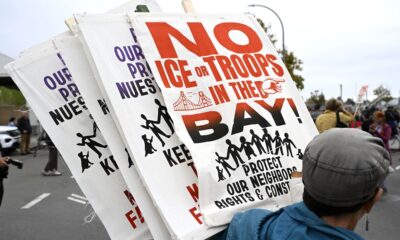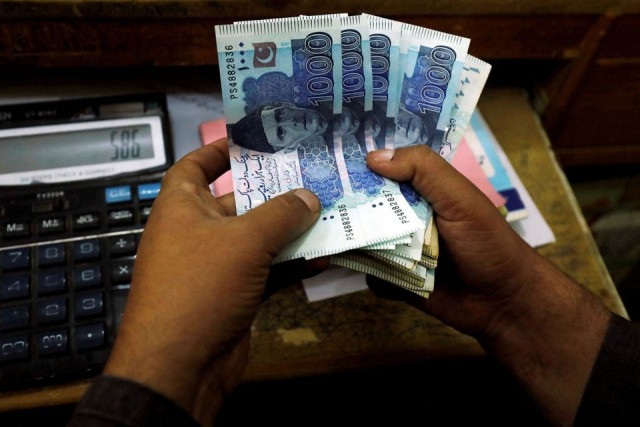Business
Trump, Pfizer agree to lower U.S. drug prices, exempt company from pharma tariffs

U.S. President Donald Trump announces a deal with Pfizer to lower Medicaid drug prices in the Oval Office of the White House on Sept. 30, 2025 in Washington, DC.
Win McNamee | Getty Images
President Donald Trump on Tuesday announced an agreement with Pfizer to voluntarily sell its medications for less, as his administration pushes to link U.S. drug prices to cheaper ones abroad.
Pfizer has agreed to take measures to reduce U.S. drug prices, including selling its existing drugs to Medicaid patients at the lowest price offered in other developed nations, or what Trump calls the most-favored-nation price, according to the president. Pfizer will also guarantee the same “most-favored-nation” pricing on its new drugs for Medicare, Medicaid and commercial payers.
As part of the deal, Pfizer has also agreed to a three-year grace period during which the company’s products won’t face pharmaceutical-specific tariffs – as long as the drugmaker further invests in U.S. manufacturing. The company plans to invest $70 billion to reshore domestic drug manufacturing and research facilities.
Shares of Pfizer rose more than 4% on Tuesday after the announcement.
“Pfizer has agreed to provide some of the most popular current medications to our consumers at heavily discounted prices anywhere between 50% and even 100%,” Trump said, adding that those drugs will be available for direct purchase at a discount online on a website the administration is calling TrumpRx.gov.
Trump said he’s working with other drugmakers to secure similar agreements over the next week, adding that Pfizer is the first.
“If we don’t make a deal, we’re going to tariff them,” he said of the other companies’ drugs.
The White House confirmed with CNBC’s Eamon Javers that Eli Lilly is in negotiations with Trump for the next drug pricing deal, without providing further details on how far along talks are.
The deal comes as Pfizer and 16 other drugmakers face Trump’s Monday deadline to take steps to lower drug prices, as outlined in letters from the president. Trump in May signed an executive order reviving a controversial plan, the “most favored nation” policy, that aims to tie the prices of some medicines in the U.S. to the significantly lower ones abroad.
During the press conference, Pfizer CEO Albert Bourla said the company satisfied all four of the requests Trump outlined in his letter. Among the other steps is pursuing tougher price negotiations abroad and adopting models that sell its medicines directly to consumers or businesses.
“The big winner clearly will be the American patients, there is no doubt,” Bourla said. “They are the ones that will see a significant impact on their ability to buy medicines.” But he said “American innovation and and the American economy” will also be “winners” with the agreement.
Pfizer’s discounted drugs
Pfizer said it will offer a large share of its primacy care treatments and certain specialty branded drugs at discounts of 50% on average and up to 85%, according to a release from the company.
In a separate statement Tuesday, Pfizer said more than 100 million patients are impacted by diseases those medicines treat, such as migraines, rheumatoid arthritis, menopause and atopic dermatitis.
The company provided examples of discounted drugs under TrumpRx.gov. Duavee, a treatment for certain menopause symptoms, will be available for as little as $30 on the site, which is an 85% discount to its current price.
Patients will also be able to pay as low as $162 – an 80% reduction to the current price – for prescription ointment Eucrisa, which is used to treat mild-to-moderate eczema. Tovias, a medication for overactive bladder, will also be available on TrumpRx.gov for as little as $42, which is a 85% discount to the current price.
Pfizer said it also plans to offer products such as Abrilada for autoimmune diseases at a 60% discount, Xeljanz for rheumatoid arthritis at a 40% discount and the migraine drug Zazvpret at 50% discount.
Those drugs don’t appear to be significant revenue drivers for Pfizer. The company’s quarterly and full-year earnings reports only include product-specific revenue for Xeljanz, which generated $349 million in worldwide sales in 2024. Sales of the drug fell 29% operationally from 2023, primarily due to lower demand globally as well as lower net prices in the U.S.
The deal comes as drugmakers brace for Trump’s planned tariffs on pharmaceuticals imported into the country. Trump said in a Truth Social post Thursday that the U.S. will impose a 100% tariff on “any branded or patented Pharmaceutical Product” entering the country from Oct. 1.
The measure will not apply to companies building drug manufacturing plants in the U.S., Trump said. He added that the exemption covers projects where construction has started, including sites that have broken ground or are under construction.
In a note on Tuesday, BMO Capital Markets analyst Evan Seigerman said the deal is positive for Pfizer’s stock and the broader pharmaceutical sector, as it “adds certainty and shifts POTUS policies potentially away from Pharma tariffs.”
“Today’s deal seems to set a path for other pharmaceutical players to follow, allowing for headline pricing concessions and a Trump ‘win’ without more punitive implementation” of the most favored nation policy or tariffs, he added.
Business
BP cautions over ‘weak’ oil trading and reveals up to £3.7bn in write-downs

BP has warned it expects to book up to five billion dollars (£3.7 billion) in write-downs across its gas and low-carbon energy division as it also said oil trading had been weak in its final quarter.
The oil giant joined FTSE 100 rival Shell, after it also last week cautioned over a weaker performance from trading, which comes amid a drop in the cost of crude.
BP said Brent crude prices averaged 63.73 dollars per barrel in the fourth quarter of last year compared with 69.13 dollars a barrel in the previous three months.
Oil prices have slumped in recent weeks, partly driven lower due to US President Donald Trump’s move to oust and detain Venezuela’s leader and lay claim to crude in the region, leading to fears of a supply glut.
In its update ahead of full-year results, BP also said it expects to book a four billion dollar (£3 billion) to five billion dollar (£3.7 billion) impairment in its so-called transition businesses, largely relating to its gas and low-carbon energy division.
But it said further progress had been made in slashing debts, with its net debt falling to between 22 billion and 23 billion dollars (£16.4 billion to £17.1 billion) at the end of 2025, down from 26.1 billion dollars (£19.4 billion) at the end of September.
It comes after the firm’s surprise move last month to appoint Woodside Energy boss Meg O’Neill as its new chief executive as Murray Auchincloss stepped down after less than two years in the role.
Ms O’Neill will start in the role on April 1, with Carol Howle, current executive vice president of supply, trading and shipping at BP, acting as chief executive on an interim basis until the new boss joins.
Ms O’Neill’s appointment has made history as she will become the first woman to run BP – and also the first to head up a top five global oil company – as well as being the first ever outsider to take on the post at BP.
Shares in BP fell 1% in morning trading on Wednesday after the latest update.
Business
Budget 2026: Kolkata realtors seek tax relief, revised affordable housing cap; eye demand revival – The Times of India

Real estate developers in Kolkata have urged the Centre to use the Union Budget to recalibrate housing policies to reflect rising land and construction costs, calling for higher tax benefits for homebuyers and a long-pending revision of the affordable housing definition to revive demand, especially in the mid-income segment, PTI reported.With the Budget set to be tabled on February 1, industry players said measures such as revisiting price caps for affordable homes, rationalising GST on under-construction properties and easing approval processes could significantly improve affordability and sales momentum.Sushil Mohta, president of CREDAI West Bengal and chairman of Merlin Group, said reforms must align with current market realities. “Revisiting the affordable housing definition, rationalising housing loan interest deductions and streamlining GST rates will significantly improve affordability and demand, especially for middle-income homebuyers,” he told PTI, adding that a policy push for rental housing and wider access to formal housing finance is crucial amid rapid urbanisation.Mahesh Agarwal, managing director of Purti Realty, said continued policy support through tax rationalisation and infrastructure spending remains critical. “A re-evaluation of affordable housing price limits in line with rising land and construction costs, along with adjustments to GST on under-construction property, will enhance affordability,” he said, stressing that simpler tax frameworks and incentives for first-time buyers would help stabilise the market and speed up project execution.Echoing similar concerns, Merlin Group MD Saket Mohta pointed to sharp increases in construction costs since the introduction of GST in 2017, underscoring the need for further rationalisation. He also called for raising the affordable housing price cap from Rs 45 lakh to around Rs 80–90 lakh and expanding unit size norms. “Mid-income housing will be the key demand driver going into 2026, and supportive tax and policy measures are essential to sustain growth,” he said.Eden Realty MD Arya Sumant said the Budget must strike a balance between fiscal discipline and growth-oriented reforms. “Higher home loan interest deductions for mid-income and first-time buyers, an updated affordable housing definition, GST rationalisation and faster approvals will improve project viability and speed-to-market,” he said, adding that sustained urban infrastructure investment would unlock demand across residential and commercial segments.Sahil Saharia, CEO of Bengal Shristi Infrastructure Development Ltd, said policy focus should shift towards large, integrated developments. “Support for mixed-use townships, rental housing and commercial hubs, along with faster clearances and digital single-window mechanisms, can help create self-sustained urban ecosystems and improve execution efficiency,” he said.Developers said clear and stable policy signals in the Budget could help restore homebuyer confidence, attract long-term capital and ensure sustainable growth for the real estate sector in eastern India.
Business
Power sector’s circular debt shoots up by Rs223 billion – SUCH TV

Circular debt in the power sector has increased in the first five months of the ongoing financial year (FY). Sources told that the debt shot up by Rs223 billion since July 2025 to reach Rs1,837 billion in November 2025 within two months of the signing of agreements to reduce the debt by Rs1225 billion.
Despite the fact that the government had signed agreements with banks in September last year to reduce the debt, it increased by Rs144 billion in October and November.
In September, the debt stood at Rs1,693 billion, while it was Rs1,614 billion in June 2025.
Sources informed that compared with November 2024, the debt in November 2025 came down by Rs544 billion.
It was Rs2,381 in November 2024, they added.
-

 Politics1 week ago
Politics1 week agoUK says provided assistance in US-led tanker seizure
-

 Entertainment1 week ago
Entertainment1 week agoDoes new US food pyramid put too much steak on your plate?
-

 Entertainment1 week ago
Entertainment1 week agoWhy did Nick Reiner’s lawyer Alan Jackson withdraw from case?
-

 Business1 week ago
Business1 week agoTrump moves to ban home purchases by institutional investors
-

 Sports1 week ago
Sports1 week agoPGA of America CEO steps down after one year to take care of mother and mother-in-law
-

 Sports4 days ago
Sports4 days agoClock is ticking for Frank at Spurs, with dwindling evidence he deserves extra time
-

 Business1 week ago
Business1 week agoBulls dominate as KSE-100 breaks past 186,000 mark – SUCH TV
-

 Business1 week ago
Business1 week agoGold prices declined in the local market – SUCH TV














